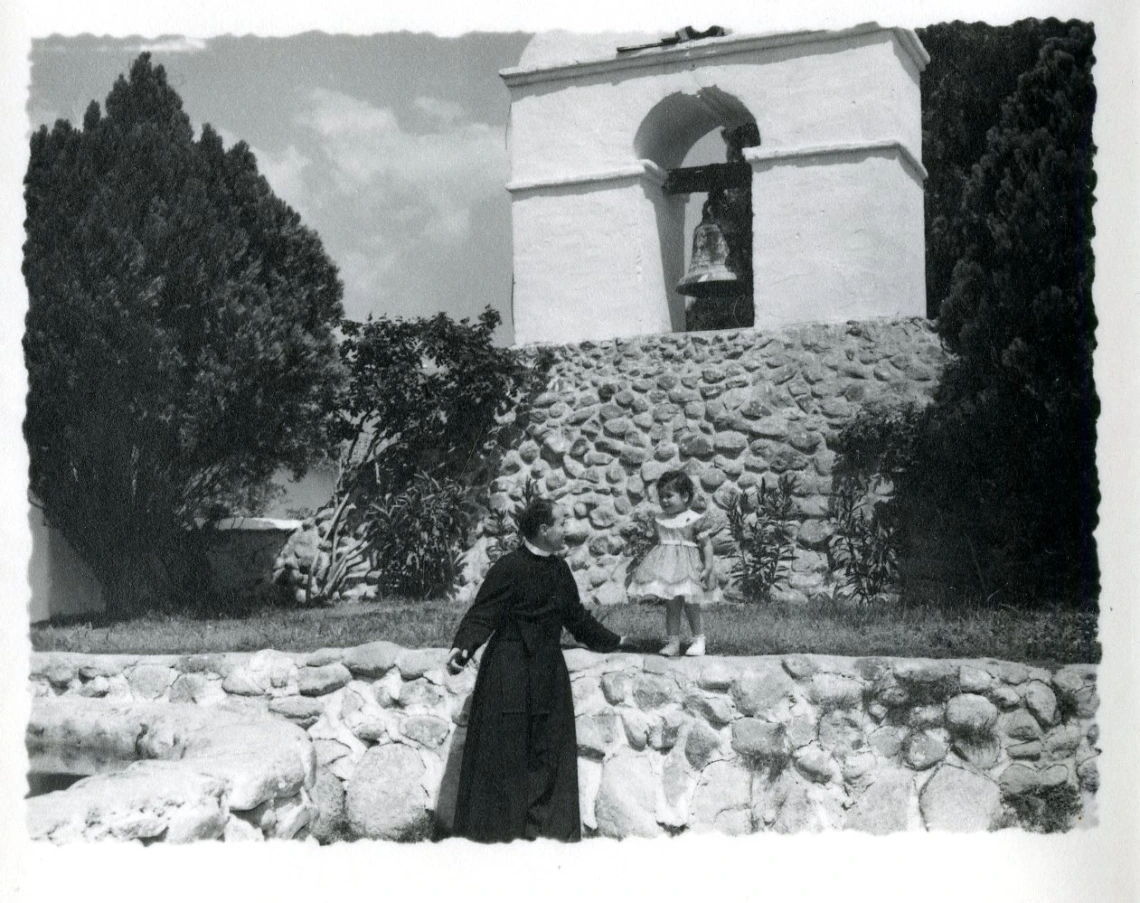Papers of George C. Barker

Mission San Antonio
Collection area: Borderlands
Collection dates: 1903-1958 bulk (bulk 1943-1957)
The collection consists of George C. Barker’s research notes, correspondence and field notes from his research activities. The research notes consist primarily of articles, offprints, newspaper clippings and secondary literature accumulated by Barker during the course of his study and research in bilingualism and folklore. Many items address issues of bilingualism in the southwestern United States, and its social manifestations.
Barker’s correspondence documents exchanges between him and his colleagues in anthropology and folklore, including Edward P. Dozier and Edward H. Spicer. Also included are correspondence with Frances Gillmor, several letters to and from the Reverend Anthony Soto, one family letter, and personal correspondence with Mexican American families in Tucson. The collection includes some correspondence addressed to Barker’s father, George C. Barker, Sr.
Barker’s works include his publications, and drafts of published and unpublished articles, papers, monographs, and reviews, field and research notes from his doctoral thesis and other projects, and transcripts of interviews. There is a handwritten manuscript of Coloquio de pastores del hijo pródigo, transcribed by ensayador Aristéo Flores, from Chapalá, Mexico. This was edited and translated by Barker and published in Folklore Studies: 2 by the University of California Press in 1953.
Visual and audio materials include 379 original kodachrome slides and 151 copies, about 70 of which are of Yaqui village scenes and Holy Week processions in the Yaqui village at Hermosillo, Mexico. The other slides are of travel scenes in various countries, inconclusively referenced in notes for a presentation and an undated index, both stored with the slides. Photographs and negatives include photos of Yaqui Indian ceremonies, several postcards, and unidentified photos of Mexico, Spain, and various ceremonies. The collection includes reel tapes of Pachuco dialogue, songs, and interviews. An edited reel has been made from the original paper tape reel. Personal names have been edited out of this duplicate reel.
Preservation xerostatic copies of a substantial portion of the materials have been made. Boxes 1-5 of the collection contain working copies of the materials, a small number of uncopied originals, and slides and photographs. Original documents of which working copies have been made are stored in boxes 6-9. The working copies of the audio tapes are housed in the Southwest Folklore Center Manuscript Collection MS 615, with the call numbers 85.2/C.1 and 85.2/R.1.
Researchers must obtain permission from the coordinator of the University of Arizona Southwest Folklore Center or the University of Arizona manuscripts librarian to use the original documents.
This collection is part of the Southwest Folklore Center collection. The Southwest Folklore Center was founded in 1979 after the dissolution of the University of Arizona Folklore Committee and collected information about folk communities, arts, music, and other humanities-related materials. This collection was previously SWF 004. The materials were transferred to Special Collections in 2017.
George C. Barker was born on November 15, 1912, in Omaha, Nebraska. He received his A.B. in history from the University of California, Los Angeles, in 1935 and an M.S. in journalism from Columbia University in 1936. After developing an interest in anthropology, he attended the University of Chicago and received an M.A. (1943) and a Ph.D. (1947) in that field. He was elected a Fellow of the American Anthropological Association in 1947.
Despite recurring poor health and physical handicaps, Barker engaged in a number of research activities. His primary areas of interest were folk drama, folk religion, Native American cultures in the Southwest, the social functions of language, and the Pachuco language of Mexican-American youths. He published various works on these topics.
Barker served as a Research Associate at the Institute of Human Relations, Yale University, in 1942, and at the University of Arizona in 1947-48. In 1950 he became a Research Associate in Anthropology at the University of California, Los Angeles, a position he held until his death in 1958. While in Los Angeles, he worked with the Los Angeles County Probation Department and the Neighborhood Youth Association of West Los Angeles on problems of Mexican-American youth.
For additional biographical information, see Harry T. Getty's biographical introduction in the 1958 reissue of: Barker, George C. Pachuco: An American-Spanish Argot and its Social Functions in Tucson, Arizona. University of Arizona Bulletin XXI:1. Social Science Bulletin, no. 18. (Tucson: University of Arizona Press, 1958) [reprinted 1970].
A collection guide explains what's in a collection. New to using our collections? Learn how to use a collection guide.
Collection guideThe collection has materials you can access online.
Access this collection
Visit us in person to access materials from this collection. Our materials are one-of-a-kind and require special care, so they can’t be checked out or taken home.
How to cite
Learn how to cite and use materials from Special Collections in your research.
